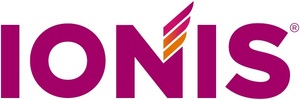CARLSBAD, Calif. and CHICAGO, May 3, 2016 /PRNewswire/ -- Ionis Pharmaceuticals, Inc. (NASDAQ: IONS) and Kastle Therapeutics, LLC today announced that Kastle has acquired global rights to develop and commercialize KYNAMRO (mipomersen sodium) injection. KYNAMRO is approved in the United States for use in patients with homozygous familial hypercholesterolemia (HoFH) to reduce low density lipoprotein-cholesterol (LDL-C), apolipoprotein B (apoB), total cholesterol (TC) and non-high density lipoprotein-cholesterol (non-HDL-C) as an adjunct to lipid lowering medications and diet.
Under the terms of the agreement, Ionis is eligible to receive up to $95 million, which includes a $15 million up-front payment, a $10 million payment three years from today and up to $70 million in sales milestones. Beginning in 2017, Ionis will earn royalties on global sales of KYNAMRO in the mid to low teens. In addition, Ionis will receive a 10 percent common equity position in Kastle's parent company. Sanofi Genzyme will earn a 3 percent royalty on sales of Kynamro and 3 percent of the cash payments Ionis receives from Kastle.
Kastle was formed in 2015 to focus on acquiring, developing and commercializing pharmaceuticals targeted toward diseases with high unmet medical needs. "As Kastle's first acquisition, KYNAMRO fits our strategy perfectly," said Bryan Stuart, president of Kastle. "KYNAMRO is an innovative and important therapy for patients with HoFH, and we are fully committed to both the product and the patients it serves. This acquisition marks a major milestone in Kastle's evolution as an emerging biopharmaceutical company. With KYNAMRO, Kastle aims to bring an established rare disease therapy to more patients in the U.S. and other regions through the pursuit of additional indications and regulatory approvals worldwide."
"We believe Kastle Therapeutics has the expertise, financial resources and initiative to maximize the commercial value of KYNAMRO. Despite the emergence of new therapies that also lower LDL-cholesterol, there remains a significant unmet medical need for HoFH patients," said Sarah Boyce, chief business officer at Ionis Pharmaceuticals. "We feel that Kastle's management team brings expertise in marketing orphan drugs for rare diseases which, combined with its ability to be nimble and focused, has the potential to greatly enhance the KYNAMRO brand. Already Kastle has commenced initiatives to identify new patients to bring onto therapy in the United States and plans to pursue marketing approval in other countries."
"KYNAMRO has demonstrated consistent and sustained LDL reductions across five randomized placebo controlled phase 3 clinical trials," said Richard Geary, Ph.D., senior vice president of development at Ionis Pharmaceuticals. "Ionis is proud of the robust clinical program supporting Kynamro."
"Kastle's acquisition of KYNAMRO is significant news for patients with HoFH who are in continued need of additional treatment options for this rare and often under-diagnosed disease," said Alan MacKenzie, Executive Chairman of Kastle. "Our outstanding commercial and business development teams were able to work quickly to negotiate a transaction with Ionis and develop a transition plan to maintain market continuity for this important product. Going forward, we will continue to look for partnerships and investments where we can help support underserved patient populations."
About KYNAMRO® (mipomersen sodium) injection
KYNAMRO is an oligonucleotide inhibitor of apolipoprotein B-100 synthesis. KYNAMRO is indicated as an adjunct to lipid-lowering medications and diet to reduce low density lipoprotein-cholesterol (LDL-C), apolipoprotein B (apo B), total cholesterol (TC), and non-high density lipoprotein-cholesterol (non HDL-C) in patients with homozygous familial hypercholesterolemia (HoFH). KYNAMRO reduces LDL-C by preventing the formation of atherogenic lipoproteins, the particles that carry cholesterol through the bloodstream. KYNAMRO acts by blocking the production of apo B, the protein that provides the structural core for these atherogenic particles, including LDL.
Limitations of Use:
- The safety and effectiveness of KYNAMRO have not been established in patients with hypercholesterolemia who do not have HoFH.
- The effect of KYNAMRO on cardiovascular morbidity and mortality has not been determined.
- The use of KYNAMRO as an adjunct to LDL apheresis is not recommended.
About Homozygous Familial Hypercholesterolemia (HoFH)
HoFH is a rare genetic disease characterized by extreme cholesterol levels. People with HoFH have inherited mutations that limit the body's ability to clear cholesterol. HoFH is extremely rare. The true prevalence of HoFH may be underestimated because of inadequate data and under-diagnosis. Medical literature includes different criteria for making an HoFH diagnosis. HoFH may be diagnosed by clinical or genetic parameters, and may be considered in cases of unusually high LDL-C. Because HoFH is genetic, it is important that all family members of people with HoFH know their cholesterol levels, regardless of their age.
ABOUT IONIS PHARMACEUTICALS, INC.
Ionis is the leading company in RNA-targeted drug discovery and development focused on developing drugs for patients who have the highest unmet medical needs, such as those patients with severe and rare diseases. Using its proprietary antisense technology, Ionis has created a large pipeline of first-in-class and/or best-in-class drugs, with over a dozen drugs in mid- to late-stage development. Drugs currently in Phase 3 development include volanesorsen, a drug Ionis is developing and, if approved, plans to commercialize through its wholly owned subsidiary, Akcea Therapeutics, to treat patients with familial chylomicronemia syndrome and familial partial lipodystrophy; IONIS-TTRRx, a drug Ionis is developing with GSK to treat patients with all forms of TTR amyloidosis; and nusinersen, a drug Ionis is developing with Biogen to treat infants and children with spinal muscular atrophy. Ionis' patents provide strong and extensive protection for its drugs and technology. Additional information about Ionis is available at www.ionispharma.com.
ABOUT KASTLE THERAPEUTICS
Kastle Therapeutics is a biopharmaceutical company focused on developing and commercializing pharmaceuticals for diseases with high unmet medical needs. Kastle Therapeutics is partnered with Flexpoint Ford, a private equity firm with $2.3 billion under management dedicated to the healthcare and financial services sectors. Kastle Therapeutics is headquartered in Chicago. For more information, please visit www.kastletherapeutics.com.
IONIS' FORWARD-LOOKING STATEMENT
This press release includes forward-looking statements regarding Ionis Pharmaceuticals' business, its agreement with Kastle Therapeutics and the development, activity, therapeutic benefit, safety and commercial potential of KYNAMRO. Any statement describing Ionis' goals, expectations, financial or other projections, intentions or beliefs is a forward-looking statement and should be considered an at-risk statement. Such statements are subject to certain risks and uncertainties, particularly those inherent in the process of discovering, developing and commercializing drugs that are safe and effective for use as human therapeutics, and in the endeavor of building a business around such drugs. Ionis' forward-looking statements also involve assumptions that, if they never materialize or prove correct, could cause its results to differ materially from those expressed or implied by such forward-looking statements. Although Ionis' forward-looking statements reflect the good faith judgment of its management, these statements are based only on facts and factors currently known by Ionis. As a result, you are cautioned not to rely on these forward-looking statements. These and other risks concerning Ionis' programs are described in additional detail in Ionis' annual report on Form 10-K for the year ended December 31, 2015, which is on file with the SEC. Copies of this and other documents are available from Ionis.
Ionis Pharmaceuticals™ is a trademark of Ionis Pharmaceuticals, Inc. Akcea Therapeutics™ is a trademark of Ionis Pharmaceuticals, Inc. KYNAMRO® is the registered trademark of Kastle Therapeutics. All rights reserved.
KYNAMRO: Important Safety Information
KYNAMRO carries a Boxed Warning for risk of hepatotoxicity. KYNAMRO can cause elevations in transaminases, and also increases hepatic fat (hepatic steatosis), with or without concomitant increases in transaminases. Hepatic steatosis associated with KYNAMRO may be a risk factor for progressive liver disease, including steatohepatitis and cirrhosis. Prescribing physicians must measure liver enzyme function (alanine aminotransferase (ALT), aspartate aminotransferase (AST), alkaline phosphatase) and total bilirubin before initiating treatment and then regularly as recommended. During treatment, physicians must withhold the dose of KYNAMRO if the ALT or AST is > 3 times the upper limit of normal, and discontinue KYNAMRO for clinically significant liver toxicity. Because of the risk of hepatotoxicity, KYNAMRO is available only through a restricted program under a Risk Evaluation and Mitigation Strategy (REMS) called the KYNAMRO REMS.
Contraindications: KYNAMRO is contraindicated in patients with moderate or severe hepatic impairment (Child-Pugh B or C) or active liver disease, including unexplained persistent elevations of serum transaminases, and patients with a known hypersensitivity to any component of KYNAMRO.
Injection Site Reactions: Injection site reactions were reported in 84% of patients receiving KYNAMRO therapy and typically consist of one or more of the following: erythema, pain, tenderness, pruritus and local swelling. Injection site reactions do not occur with all injections but resulted in discontinuation of therapy in 5% of patients in pooled Phase 3 trials. To minimize the potential for injection site reactions, proper technique for subcutaneous administration should be followed.
Flu-Like Symptoms: Flu-like symptoms were reported in 30% of patients receiving KYNAMRO therapy and include one or more of the following: influenza-like illness, pyrexia, chills, myalgia, arthralgia, malaise or fatigue. Symptoms, which typically occur within 2 days after an injection, do not occur with all injections but resulted in discontinuation of therapy in 3% of patients in pooled Phase 3 trials.
Adverse Reactions: Safety data are based on pooled results from four Phase 3 trials with a total of 390 patients of which 261 patients received weekly subcutaneous injections of 200 mg of KYNAMRO and 129 patients received placebo for a median treatment duration of 25 weeks. Eighteen percent of patients on KYNAMRO and 2% of patients on placebo discontinued treatment due to adverse reactions. The five most common adverse reactions in patients treated with KYNAMRO that led to treatment discontinuation and occurred at a rate greater than placebo were: injection site reactions (5.0%), alanine aminotransferase increased (3.4%), flu-like symptoms (2.7%), aspartate aminotransferase increased (2.3%), and liver function test abnormal (1.5%). The most commonly reported adverse reactions (incidence > 10% and greater than placebo) are injection site reactions (84% vs 33%), flu-like symptoms (29.9% vs 16.3%), nausea (14% vs 8%), headache (12% vs 9%) and elevations in serum transaminases, specifically ALT (10% vs 1%).
Pregnancy: There are no adequate and well-controlled studies in pregnant women. KYNAMRO should be used during pregnancy only if clearly needed. Females who become pregnant during KYNAMRO therapy should notify their healthcare provider. Females of reproductive potential should use effective contraception during KYNAMRO therapy.
Nursing Mothers: It is not known whether KYNAMRO is excreted in human milk. Discontinue drug or nursing, taking into account the importance of the drug to the mother.
Pediatric Patients: Safety and effectiveness have not been established in pediatric patients.
Geriatric Use: Clinical studies of KYNAMRO did not include sufficient numbers of patients aged 65 and over to determine whether they respond differently from younger patients. In the pooled Phase 3 trials, patients > 65 years of age treated with KYNAMRO had a higher incidence of hypertension and peripheral edema compared to placebo patients in this age group, as well as compared to the younger KYNAMRO-treated age group. Hepatic steatosis was also reported with greater frequency in the > 65 group (13.6%) compared to the < 65 group (10.4%).
Renal Impairment: The safety and efficacy of KYNAMRO treatment in patients with known renal impairment or in patients undergoing renal dialysis have not been established. Due to the lack of clinical data and KYNAMRO's renal safety profile, KYNAMRO is not recommended in patients with severe renal impairment, clinically significant proteinuria, or on renal dialysis.
Hepatic Impairment: The safety and efficacy of KYNAMRO treatment in patients with known hepatic impairment have not been established. KYNAMRO is contraindicated in patients with clinically significant hepatic dysfunction, which may include persistent elevations of transaminases.
To review the full Prescribing Information, please visit www.kynamro.com.
Logo - http://photos.prnewswire.com/prnh/20151221/317736LOGO
Logo - http://photos.prnewswire.com/prnh/20160502/362754LOGO
SOURCE Ionis Pharmaceuticals, Inc.
Related Links
WANT YOUR COMPANY'S NEWS FEATURED ON PRNEWSWIRE.COM?
Newsrooms &
Influencers
Digital Media
Outlets
Journalists
Opted In






Share this article